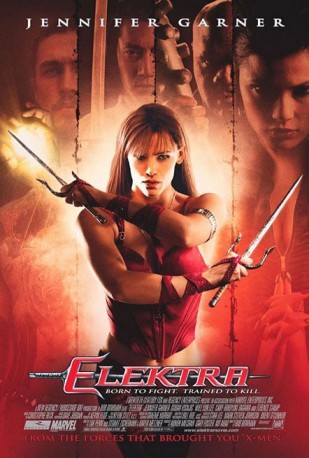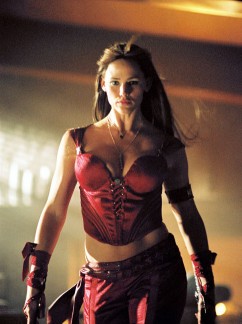|
Elektra
Dear
2005, so far you’re Zero for Two. What’s next?
Like
its predecessor, Daredevil, Elektra is
a flat out disappointment. It's true that screenwriters
Zak Penn and Stu Zicherman draw loosely from Frank Miller's
graphic novel Elektra: Assassin, but that’s
not enough to make a difference.
Ultimately,
it all boils down to poor casting, poor characterization
and poor treatment of a solid property. I still can't seem
to warm up to Jennifer Garner as Elektra no matter how hard
I try, and bottom line, I find myself not caring for her
on film the way I did for her comic book counterpart. Miller’s
Elektra was a tough as nails assassin whose mind was her
only Achilles Heel. Fragile and broken psychologically,
Elektra’s past was as much a part of her definition
as her present activity, whether that be killing for hire
or seeking revenge.
The
irony is that Daredevil affects Elektra
in a very interesting fashion. We all know Daredevil
suffered extreme cuts to meet a PG-13 rating, and all parties
involved claim that the film ultimately suffered because
of it. This is certainly plausible. They've since released
a “Director's Cut” of the film, which supposedly
"rights" the "wrongs" committed in the
first film, but I have yet to give it a whirl.
How
this affects Elektra is that the film feels almost
untouched in a very wrong way allowing it to meander at
times. It's as if the execs decided to back off completely
and refrain from forcing cuts to avoid a repeat of the earlier
movie at the box office. However, what is lacking is some
much needed trimming to better the flow of narrative, and
pull this in as a decent sub-par action film. The first
act is an exercise in patience as it is so tedious that
when it finally reaches its destination the payoff feels
moderate and slightly underwhelming.
 |
The
appearance of Stick (Terence Stamp) and Typhoid Mary (Natassia
Malthe), here dubbed only as Typhoid, certainly make the
film more interesting, but it isn’t difficult to feel
unsettled with the characterization employed here as well.
Stick plays “master” well enough, but not enough
is yielded to understanding him, what he means to Elektra,
and his relationship to The Hand. Absent is the understanding,
or even the reasoning that made these characters so pivotal
in the comics. Typhoid Mary is a character so deadly that
her presence exudes pestilence and decay. She literally
has a lethal touch, and worthy of being feared. CG effects
are used well enough to establish her powers, but she serves
as, ultimately, an afterthought, completely devoid of any
real threat within the confines of her role.
What
lacks most is the depth needed to make Elektra truly intriguing.
Where is the student that grew so powerful and deadly in
her skill that she killed her own sensei to gain acceptance
into The Hand? Where is the woman so cracked that she finds
her memories turning on her as she searches for peace amongst
recollection? Where is the cold blooded assassin who agrees
to kill for money, and then names her price at two dollars?
None of these issues are even grazed in this adaptation,
and what we wind up with is a character so filled with brood
and nuance, yet lacking the justified reasoning for being
this way.
It's
one thing to say that “killing” has hardened
Elektra, it’s another to dive into the how and why
it has hardened her. That has always been where the intrigue
behind the character has flourished, because artists chose
to address these issues and work through them, not dance
around them and use inference to suggest that something
more might exist underneath the surface. Miller’s
Elektra blended the questionable ethics of noir with the
personal internal struggle with one’s past.
Here
we blend spectacle with Jennifer Garner in a red suit.
Viewers
that make it through the troublesome first act will be rewarded
with a stew that never really comes to a full boil. There
are enjoyable elements here, and the introduction to Abby
Miller (Kirsten Prout), who is basically a younger version
of Elektra, is equal parts compelling and ridiculous. The
fact that it compels at all is credited to Prout, who manages
to make you care for her character in a way Garner is never
able to fully harness. The situation remains preposterous
because this film should spend more time answer questions
about its main character instead of developing another character
altogether.
The
film draws correlations between Abby and Elektra, and even
plays on the idea that Elektra helps Abby and her father
Mark (Goran Visnjic) because she wants a better life for
Abby than she had as a young budding killer. That’s
fine and well-intended, but we don’t fully comprehend
the depths to which Elektra’s life has sunk to fully
feel for her in this regard. Sure, her father Nikolas was
killed in the previous film, and we see flashbacks of an
eight year old Elektra discovering her dead mother (Jana
Mitsoula). Yet even these tragic events are underscored
so heavily that we dismiss them almost entirely.
To add
to this disconnect, Nikolas Natchios (Kurt Max Runte) is
portrayed hear as an overbearing father, bent on pushing
Elektra to the extreme limits by forcing her to stay afloat
in a pool when she is too tired to tread any more water.
This near drowning is presented as a moment of torment from
her youth, and hardly supports the endearing nature of her
relationship with her father from the previous film.
This
time around, director Mark Steven Johnson wisely chose to
remain only an Executive Producer, turning the helm over
to Rob Bowman. This was a wise move because the screenplay
alone appears to falter emotionally and characteristically
all over the map.
In the
end, Elektra is bound to disappoint comic Fanboys,
without a doubt. Many unfamiliar with the character’s
comic pursuits will likely fall on either side of the fence,
because despite a lukewarm center, the film eventually leaves
too many loose and dangling threads unanswered. This sacrifice
of cogent storytelling is undoubtedly in hopes of a hit
this weekend, which would ensure a sequel to the franchise.
Rating:

|








